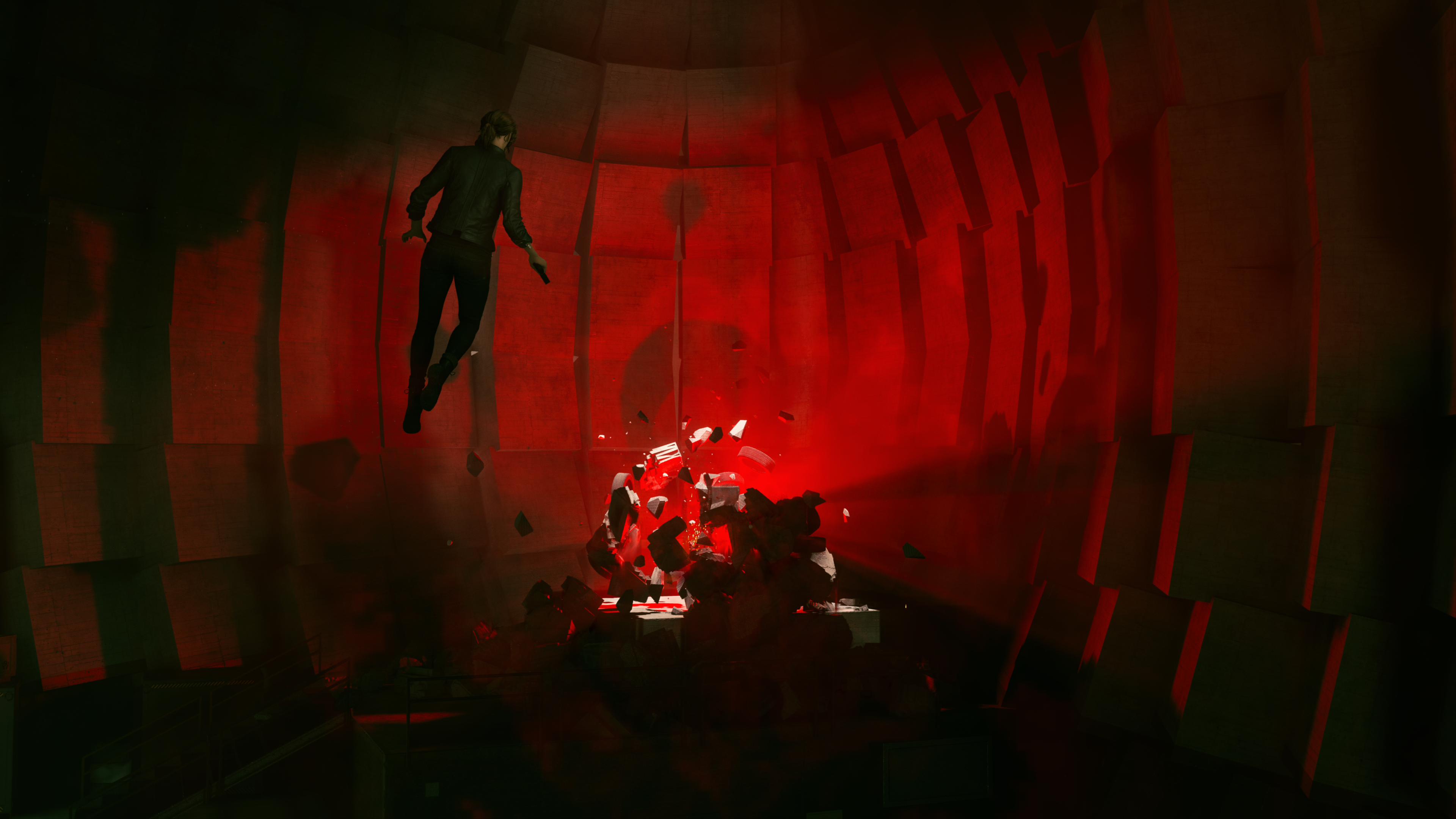Tom's Guide Verdict
Control's fun gameplay mechanics are buried under bad narrative and bad game design.
Pros
- +
Impressive environmental detail
- +
Superpowers are fun
- +
The incredible maze level
Cons
- -
An incoherent, insufferable story
- -
Cardboard-cutout characters
- -
Overt lack of originality
- -
Weak level design
- -
Obnoxious enemy gauntlets
Why you can trust Tom's Guide
Tell me if you've heard this one before: A girl gets nosebleeds when she uses her telekinetic powers to combat supernatural entities summoned by a sketchy government agency tampering with a nega-dimension beyond its control. Oh, and the first time the girl discovered that nega-dimension, she was 11 years old. Get it? Eleven? Control copies the Netflix series Stranger Things so directly it's embarrassing, and in the game's push to imitate a TV show, it has entirely forgotten its true purpose: to be a good game.
That's just the tip of the iceberg with Control's identity issues. Sometimes, it wants to pretend to be other, better games from its developer, Remedy Entertainment. Control lifts the spooky, "infected" design concepts for enemies and the cliffhanger-riddled, painfully ambiguous story from Alan Wake. This title mooches the entire game engine and aesthetic, and even a few superpower mechanics, from Quantum Break. Yet, as much as Control apes the games that came before it, this title can't consistently capture their magic or competent execution.
A story better off forgotten

Unlike Remedy's other titles, Control has no characters worth remembering or story worth telling. In broad strokes, the narrative is a fan rewrite of Stranger Things, with lower stakes, less interesting world building (most of which is relegated to lore-infused collectibles) and a delivery so shallow that it genuinely feels like the writers don't have all, or even most, of the answers themselves.
As for characters, each one is a cardboard cutout. You play as Jesse Faden, a hypercompetent, bland-as-bread protagonist who has no flaws to overcome or character arc to explore. Jesse is randomly given the role of "chosen one," and all of the supporting cast decide she's perfect and trustworthy mere seconds after meeting her. None of them have any personality. They're just mouthpieces to facilitate sloppy exposition. A few come close to engaging in funny dialogue, but such moments are few and far between.

Speaking of dialogue, it's atrocious. Jesse constantly narrates the most obvious thoughts, and Control's in-universe lingo is beyond cringeworthy—the overly frequent use of schlocky phrases like "The Hiss," "The Oldest House" and the painfully generic "Objects of Power" becomes grating after a while. This isn't the artfully campy stuff of Remedy's other games; this is what happens when no one tells writers to revise their first draft. Or, at least, it sure seems like that's what happened.
How Control fails so miserably in its narrative is a mystery; it's a complete 180 from Remedy's other work. Alan Wake was a complex protagonist who wrestled with failing his wife and career, and he underwent a real arc in his games. Quantum Break at least had a solid supporting cast to back up its simplistic protagonist, Jack Joyce. What happened here, writers?
The need for quality control

Control's gameplay fares better than its story, but that isn't saying much. This game lifts Quantum Break's superpowered, third-person shooter design and slightly remixes it, often for the worse. The only gun you get in this game is a dinky pistol. It can transform into a few other dinky pistols, but they're not much better.
As for superpowers, there are a few, with the three most notable being levitation, telekinesis and a dash move. It feels good to use these powers, and they single-handedly save the game from being unplayably boring. Sadly, an energy bar restricts how often you can use these powers, which throttles them. Also, some powers are unlocked only via optional side missions. I managed to find them all, but be warned: If you skip the detour content, you can beat this game without acquiring some of the only tools that make it fun.
Antagonising anachronisms

For a good chunk of the game, your health bar about equals most enemies' bars, meaning you can get two-shotted fairly easily. Death is a very real threat in Control.
Dying is made even worse by the atrocious checkpoint system. With each death, you'll have to suffer through a lengthy load time and redo at least a few rooms' worth of progress. That includes any snippets of story that take place along the way. This approach makes dying a punishment for all the wrong reasons.
You'll face that punishment a decent number of times, because the game loves throwing exhausting waves of generic enemies at you, and you'll have to repeat all of them if you slip up and die even by the very last enemy's hand. It doesn't help that the game's frame rate occasionally drops off a cliff during tense firefights; at least, it did on my standard PS4 Slim. And there's only one difficulty setting, so you can't cancel out these issues by turning the heat down a notch.
A certain mission, the details of which I'll leave unspecified, exacerbates these problems tenfold. This mission includes many enemy waves and no checkpoints at all, and to make matters worse, everything is red. Incoming projectiles and grenades, the enemies, the skybox, the terrain — they're all red. Seeing what's going on is nigh impossible. And the "reward" for beating the mission is just an extra kick in the teeth.

When you're not plowing through endless gauntlets of uninteresting foes, you'll explore the game's maze-like levels. Control fails to grok some important aspects of the Metroidvania genre it has crammed itself into. That is, its lackluster maps fail to provide enough detail and its needlessly convoluted stage layouts often fail to subtly point you in the right direction. This all makes it that much more ironic that the most well-designed level in the game is a literal maze.
Get instant access to breaking news, the hottest reviews, great deals and helpful tips.
There's a magical moment in Control when Remedy stops ripping off other IPs and remembers that it's very good at making original content. Enter the maze. It brings back the Old Gods of Asgard, the preferred pseudonym of a band utilized by Remedy since its Max Payne days, to serenade you with rock music as you dash through a shape-shifting madhouse. It's like if the hotel scenes from Inception melded with the clockwork mansion from Dishonored 2. If the whole game had been on par with this one imaginative segment, Control could've been spectacular.
A controlling interest in your time

It takes only 8 hours or so to blast through Control's main story, though the wealth of side content can double the playtime. Control offers a number of player upgrades and rewards to incentivize completing these optional excursions, but given the aforementioned issues Control has, playing beyond what's required may not be an appetizing proposition.
As it stands, I can't recommend Control to anyone besides casual sci-fi, third-person shooter fans who need a quick triple-A fix. This game has some good sides, like its incredible attention to detail and stylish environmental destruction, but all the window dressing in the world can't make up for a fundamentally frustrating experience.
It seems Remedy is keeping its games self-contained but full of references to each other in order to maintain future crossover potential. If Remedy plans a shared universe involving Alan Wake, Quantum Break and Control, the game maker needs to work harder to ensure consistent quality, because one of those things is not like the others.
Robert Carnevale is a News Editor at Windows Central. In the past, his work has appeared on other sites, such as Tom's Guide, Tom's Hardware, Laptop Mag, MSN, Wired, Looper, and more. Also an author, he has written a novel, Cold War 2395. He loves Sci-Fi and Sonic The Hedgehog.






